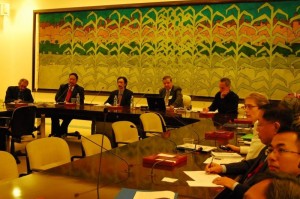a) To explain to Country representatives and observers of the 4th IGG session on bananas and 5 th session on tropical fruits on the core activities of TFNet and the benefits derived from being a member of the network.
b) To highlight the current scenario of the tropical fruit industry especially in the areas of postharvest management, efficiency of the value chain, nutritional and health benefits, and the potential of underutilized and indigenous fruit for nutrition, health and livelihood of the rural community.
c) To attract more countries and other organizations to be members of TFNet
TFNet was represented by Board members:
– Vice Chairman, Mr. Muawya Abd. Jabar from Syria,
– Dr. Hannah Jaenicke, Crops for the Future, Sri Lanka
– Dr. Errol Hewett, Massey University, N. Zealand
– Mr. Kaison Chang, FAO
– Mr. Yacob Ahmad, TFNet Secretariat
The side event was attended by 17 delegates, of which 8 were country representatives from Indonesia, Philippines, Oman and Malaysia. The other delegates were from the various divisions of the FAO.
 The event began with an introductory remark by Mr. Kaison Chang, Secretary for the IGG on Banana and Tropical Fruits who welcomed all delegates and expressed the hope that this event would be a positive indication that TFNet is reaching out to expand its membership base to the countries that were present.
The event began with an introductory remark by Mr. Kaison Chang, Secretary for the IGG on Banana and Tropical Fruits who welcomed all delegates and expressed the hope that this event would be a positive indication that TFNet is reaching out to expand its membership base to the countries that were present.
The side event proceeded with an introduction by the TFNet CEO, Mr. Yacob Ahmad who explained the purpose and objectives of the side event After introduction of the TFNet delegates, the country member from Syria, Mr. Muawya Abd. Jabar gave a presentation on the background of the Syrian Fruit Industry and the benefits of joining TFNet.
This was followed by a presentation by Mr. Yacob on the role, activities and benefit of TFNet. Dr. Errol Hewett continued the session with his presentation on ‘Value chains for tropical and subtropical fruits – reducing losses, improving profitability, reducing poverty, assisting food security through enhanced supply chain management’.
Dr. Hannah Jaenicke then presented on the ‘Potential of minor / indigenous tropical fruits for nutrition and economic benefits of the farming communities’, where she highlighted the most important nutrient deficiencies and the importance of these fruits as sources of phytochemicals and monosaturated fats in mitigating malnutrition. She also discussed the constraints in developing these fruits economically due to the lack of standards and inadequate studies.
The session continued with a final presentation by Dr. Errol Hewett on ‘Consumer demand, marketing and global trade for tropical fruits’. In this presentation, Dr. Errol emphasized on the importance of consumer demand and the increasing trend of quality, safe and hygienic food products. He also discussed on the food trends that are now in vogue in consuming countries and why exporters of these fruits should comply.
In the ensuing Question and Answer sessions, delegates exchanged view and comments on the technical aspects of the presentations which included experiences and pragmatic approaches to address issues related to the development of the tropical fruit industry pertaining to consumer demand, post harvest management and marketing. The issue on the use of tropical fruit as a major contributor to combat malnutrition was also emphasized.
The side event ended with closing remarks by the TFNet CEO who expressed his gratitude to delegates who attended and participated actively. He also hoped that the event had been beneficial and successful in giving an insight of the current scenario of the global tropical fruit industry, and what TFNet can do to further its cause to improve it.
